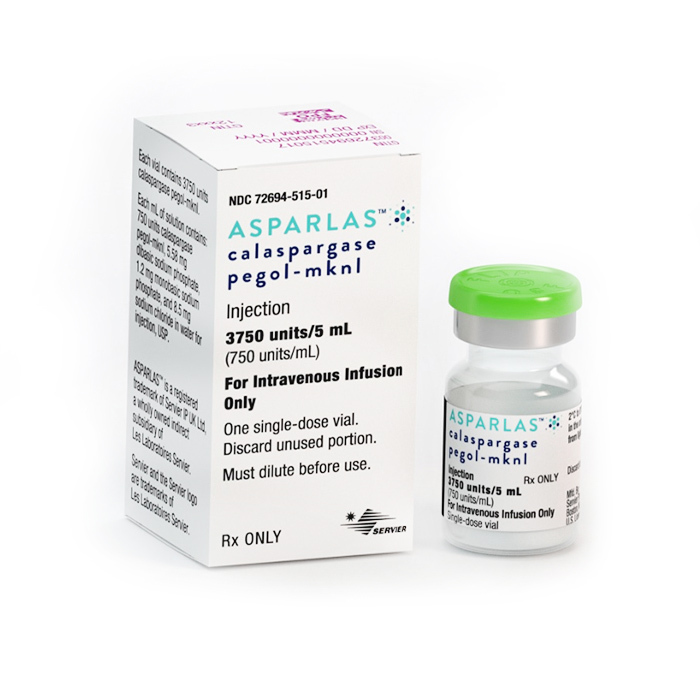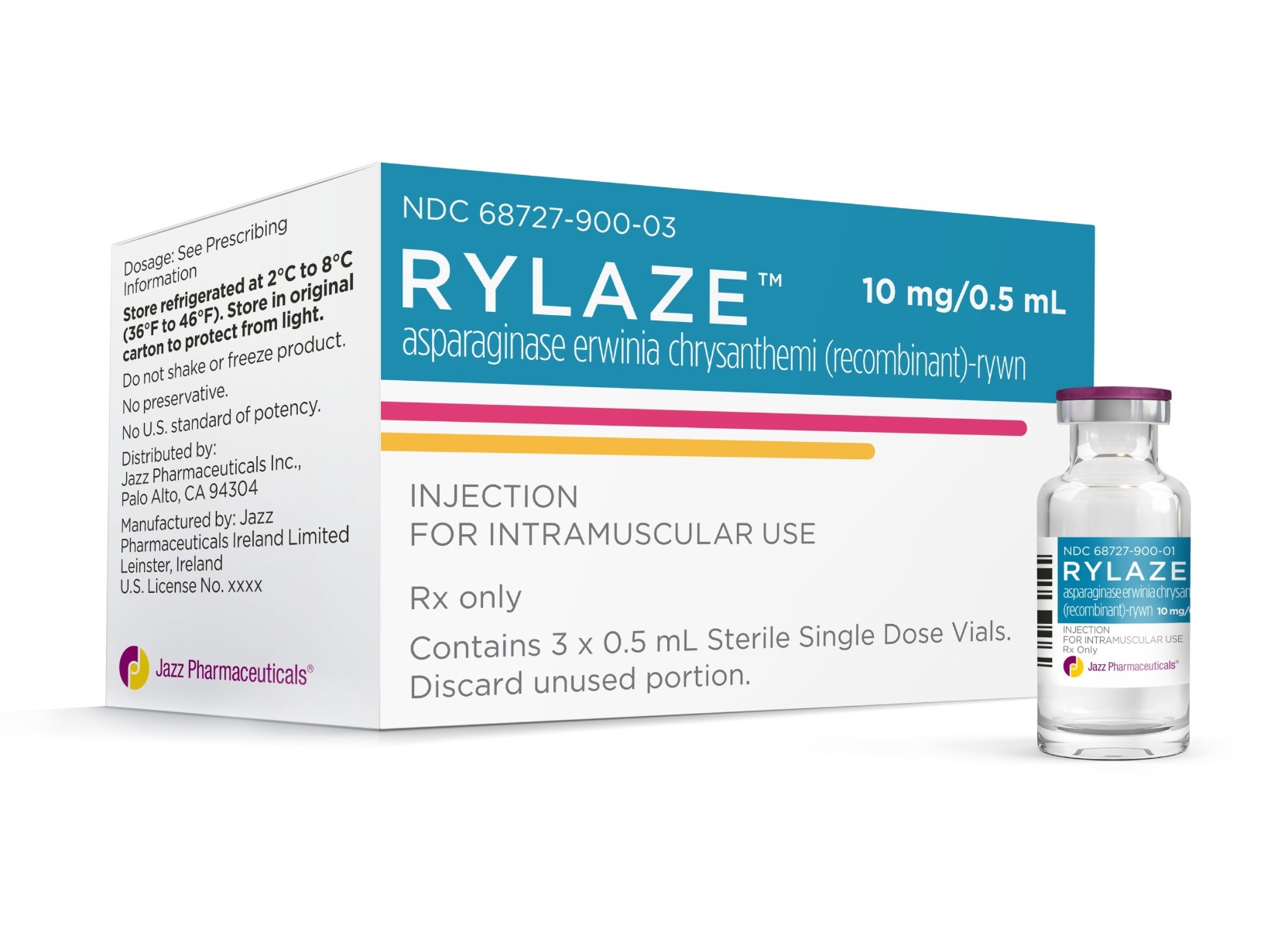Asparlas (calaspargase pegol-mknl) vs Rylaze (asparaginase erwinia chrysanthemi (recombinant)-rywn)
Asparlas (calaspargase pegol-mknl) vs Rylaze (asparaginase erwinia chrysanthemi (recombinant)-rywn)
Asparlas (calaspargase pegol-mknl) and Rylaze (asparaginase erwinia chrysanthemi (recombinant)-rywn) are both asparaginase-based therapies used in the treatment of acute lymphoblastic leukemia (ALL), but they differ in their formulation and dosing schedules. Asparlas is a pegylated form of asparaginase that allows for less frequent dosing, typically once every three weeks, due to its extended circulation time in the body. In contrast, Rylaze is a recombinant form of Erwinia asparaginase with a shorter half-life, requiring more frequent administration, usually every 48 hours, which can be beneficial for patients who have developed hypersensitivity to other forms of asparaginase or require a more flexible dosing schedule due to other considerations.
Difference between Asparlas and Rylaze
| Metric | Asparlas (calaspargase pegol-mknl) | Rylaze (asparaginase erwinia chrysanthemi (recombinant)-rywn) |
|---|---|---|
| Generic name | Calaspargase pegol-mknl | Asparaginase erwinia chrysanthemi (recombinant)-rywn |
| Indications | Acute lymphoblastic leukemia (ALL) | Acute lymphoblastic leukemia (ALL) in patients who have developed hypersensitivity to E. coli-derived asparaginase |
| Mechanism of action | Depletes the amino acid asparagine, which leukemia cells are unable to synthesize | Depletes the amino acid asparagine, which leukemia cells are unable to synthesize |
| Brand names | Asparlas | Rylaze |
| Administrative route | Intravenous | Intramuscular |
| Side effects | Allergic reactions, elevated liver enzymes, pancreatitis, abnormal clotting, high blood sugar, etc. | Allergic reactions, pancreatitis, abnormal clotting, high blood sugar, liver toxicity, etc. |
| Contraindications | Hypersensitivity to calaspargase pegol, pegylated products, or any of its components | Hypersensitivity to asparaginase erwinia chrysanthemi, any of its components, or to any product containing Erwinia chrysanthemi |
| Drug class | Antineoplastic agent | Antineoplastic agent |
| Manufacturer | Servier Pharmaceuticals | Jazz Pharmaceuticals |
Efficacy
Asparlas (Calaspargase Pegol-mknl) Efficacy in Leukemia
Asparlas, known generically as calaspargase pegol-mknl, is a pegylated form of the enzyme L-asparaginase, and it is used in the treatment of acute lymphoblastic leukemia (ALL). This medication is specifically indicated for use in pediatric and young adult patients. The efficacy of Asparlas in this patient population was established in a clinical trial that was part of a multi-agent chemotherapeutic regimen for ALL. Patients treated with Asparlas demonstrated a high rate of complete remission, with a remission rate comparable to that achieved with native L-asparaginase products. The extended half-life of Asparlas allows for less frequent dosing, which can improve patient compliance and quality of life.
Rylaze (Asparaginase Erwinia Chrysanthemi (Recombinant)-rywn) Efficacy in Leukemia
Rylaze, also known as asparaginase Erwinia chrysanthemi (recombinant)-rywn, is a recombinant form of Erwinia asparaginase. It is used as a component of a multi-agent chemotherapeutic regimen for the treatment of ALL and lymphoblastic lymphoma. Rylaze is specifically designed for patients who have developed hypersensitivity to E. coli-derived asparaginase. Clinical trials have shown that Rylaze is effective in maintaining therapeutic levels of asparaginase activity, which is critical for the depletion of serum asparagine and the resultant cytotoxic effect on leukemia cells. The use of Rylaze in clinical practice has been associated with successful induction of remission in patients with ALL.
Comparative Efficacy in Leukemia Treatment
Both Asparlas and Rylaze play a crucial role in the treatment of ALL by targeting the metabolism of leukemia cells. While Asparlas offers the advantage of prolonged activity, allowing for a reduced dosing frequency, Rylaze is particularly valuable for patients who cannot tolerate other forms of asparaginase due to allergic reactions. The efficacy of these drugs in achieving and maintaining remission in ALL highlights the importance of asparaginase enzymes in the chemotherapeutic arsenal against leukemia. However, the choice between these two medications may depend on individual patient needs, including the presence of hypersensitivity reactions and the desired dosing schedule.
Conclusion on Efficacy
In conclusion, both Asparlas and Rylaze have demonstrated efficacy in the treatment of ALL as part of a multi-agent chemotherapy regimen. Their use is supported by clinical trials and their ability to achieve therapeutic levels of asparaginase activity, which is essential for the treatment of ALL. The selection of either Asparlas or Rylaze should be tailored to the patient's specific clinical circumstances, with consideration for potential hypersensitivity and dosing preferences. Ongoing research and clinical experience continue to refine the use of these medications to maximize their efficacy in the management of leukemia.
Regulatory Agency Approvals
Asparlas
-
Food and Drug Administration (FDA), USA

Rylaze
-
Food and Drug Administration (FDA), USA

Access Asparlas or Rylaze today
If Asparlas or Rylaze are not approved or available in your country (e.g. due to supply issues), you can access them via Everyone.org.
How it works

Make an enquiry
Choose the medicine you want to buy, answer a couple of questions, and upload your prescription to speed things up. We’ll get back to you within 24 hours.


Make an enquiry
Choose the medicine you want to buy, answer a couple of questions, and upload your prescription to speed things up. We’ll get back to you within 24 hours.


Breeze through the paperwork
We'll guide you through the required documents for importing unapproved medicine, ensuring you have all the necessary information.


Get a personalized quote
We’ll prepare a quote for you, including medicine costs and any shipping, administrative, or import fees that may apply.


Receive your medicine
Accept the quote and we’ll handle the rest - sourcing and safely delivering your medicine.

Some text on this page has been automatically generated. Speak to your physician before you start a new treatment or medication.
Let's talk
If you have any questions, call us or send us a message through WhatsApp or email:
Contact us




